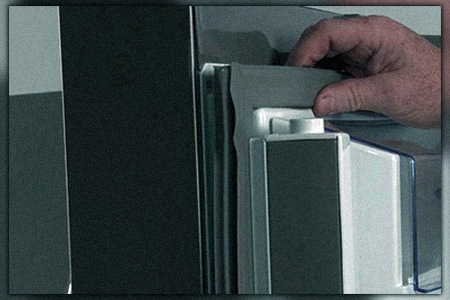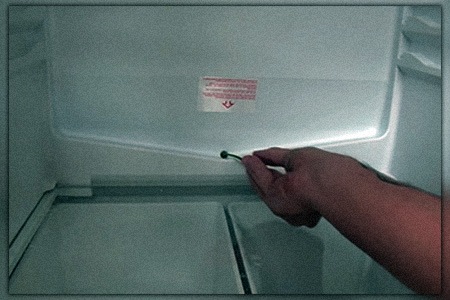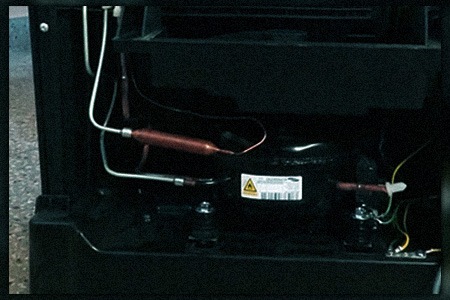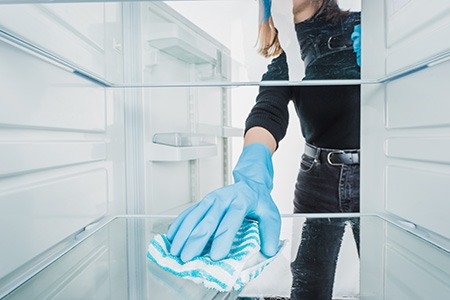Why Your Fridge Smells Bad Even After Cleaning
Author: Anne Cowart | Editor: Omar Alonso
Review & Research: Jen Worst & Chris Miller

Have you opened the fridge door to find a honking stench coming from the appliance? It's time to get to work and clean it to remove the smell. But what happens if your fridge smells bad even after cleaning? What gives? You could have sworn you thoroughly cleaned it, but the odors remain.
If your fridge is so smelly, you're scared to open the door, and you've already cleaned it out – what are your options now? Fridges usually smell because of bacteria growth in the unit. While bacteria are on everything, it only starts to produce an odor when the bacteria reach high concentrations.
It's the same principle as grease traps in buildings like restaurants and hotels. Normally, they don't produce an odor. However, if the microbes grow undeterred, they emit a foul smell, creating a health risk for workers.
The last thing you want is your fridge growing bacteria out of control. This can happen in any type of fridge, no matter how nice it is. Fortunately, a good cleaning is all it takes to eliminate the bacteria. That said, it could be a couple of days before your fridge stops stinking, and this post explains why.
Why Does My Fridge Smell Bad Despite a Deep Cleaning?
Why does my fridge smell? Somebody just tell me! The primary culprit for a smelly fridge is food that went rancid and started to rot. If you have old veggies in the crisper drawer beginning to rot, they might be responsible. Or perhaps it's that box of two-week-old Chinese takeout languishing at the back of the top shelf you forgot was there.
Rotting food attracts bacteria, which multiply and build up, producing a foul smell. So, the first thing to do is get rid of all the old food and see if that makes a difference to the stench coming from the fridge. But this also goes for food crumbs and goo shoved into cracks and crevices.
Mold or Bacterial Growth in the Fridge Seal

The fridge seal is the plastic/rubber ring around the door that compresses when you close it, providing an airtight seal. It prevents the cold air generated by the fridge system from leaking out. If you have a broken seal, the fridge won't be able to stay cold, and you'll notice the compartment warms up and your food and beverages start to go off.
The fridge seal has a design involving small ridges along the exterior that compress when you close the door. It's common for people to accidentally drop small bits of food in the interior or exterior gaps or spill liquids in them. Since this food is not refrigerated, it rots, attracting bacteria that create odors.
Clean the seal, remove all the food waste, and see if it makes a difference. If not, you might have another problem causing the odor. Whenever I wonder why does my refrigerator smell, it's usually hidden crud in the seals and in the crevices.
Bacteria or Mold Growth Between the Shelf & the Drip Protector
Most refrigerators come with drip protectors on the shelves. These are the plastic inserts that clip to the front and rear shelving. If anything leaks, the spill protectors prevent the liquids from running over the front and back of the shelving, into the doors, and down to another level.
Most people who notice a spill on the shelf clean it with a cloth. They don't take the time to remove it from the fridge and clean it properly. As a result, the liquid might get underneath the drip protector, where it starts to decay and rot, producing a stench. This is a leading cause for why your fridge smells bad even after cleaning.
Blocked Drainage Hole

The rear panel of the fridge's interior experiences defrosted water running down towards a crevice at the back of the fridge base in the cold compartment. The water seeps through a drainage hole, where the fridge auto-evaporates it.
If this hole experiences a slight blockage from food waste, it hampers the fridge's ability to drain, but it might not be to the extent where water spills over into the compartment. As a result, the food can go unnoticed and start to rot. As it decays, bacteria multiply, resulting in a foul odor. If you've done everything and are still screaming "why does my fridge smell bad" this might be the cause.
Dirty Drip Pans

You might not be aware that your fridge has an external drip pan underneath it on some models. This tray collects the water from the drain hole discussed above. Most people aren't aware it's even there, and they never bother cleaning it.
If some food or beverage waste ends up in the tray, it can rot and cause odors to develop. If you notice the fridge smells bad, even with the door closed, it might be the cause of the issue. Here are tips to find and clean your drip pan. While you're under there it'll be a good chance to investigate why your refrigerator is making clicking noises, too.
Moisture & Temperature Control Problems
Most fridges come with a temperature thermostat regulating the interior chiller compartment to temperatures between 37 to 40 °F, according to the FDA. Most models also have an adjustable thermostat, allowing you to set the temperature in the compartment.
However, these thermostats might malfunction, resulting in the fridge's interior getting warmer than it should and food spoiling faster than normal. Most people will notice their fridge is getting warmer, but the bacteria growth inside the unit might already be getting out of hand by then.
Top Ideas for Deodorizing the Refrigerator
So, if your fridge is smelly, what can you do about it, especially if your fridge smells bad even after cleaning? If there are no problems with the temperature regulation, and the fridge is still cold, it's time to give it a good cleaning. So, what do you use to clean the fridge? This section covers the best cleaning materials for the fridge and how to use them.
White Spirit Vinegar & Lemon Juice
The first step in removing odors from your fridge is to clean it out. Take everything out of the fridge and remove the shelves and drip protectors. Fill a bucket with warm water and squeeze the juice of four lemons into it, along with six tablespoons of white vinegar.
Mix the liquid and use it to clean out the fridge with an old rag. Leave the shelves and drip protectors in the sink while you work, and fill the sink with the same liquid. After you finish cleaning, dry out the fridge, return the shelves and drip protectors and replace the food before it goes off.
Baking Soda

Baking soda is one of the most impressive cleaning agents available in the kitchen, and it's a low-cost alternative to expensive deodorizers and is useful in deodorizing a microwave, a fridge, and so forth. If you have a lingering scent in the fridge, pour some baking soda into a jar and leave it open in the fridge for three days. Whatever you do, don't mix baking soda and bleach.
The baking soda absorbs the odors, returning the fridge to its normal state. However, you'll have to clean the fridge if the smell is too bad and then leave the baking soda to do its job. Otherwise, the multiplying bacteria will eventually overpower the soda, and nothing will stop the stench from spreading.
Other Fridge Deodorizing Options
If you don't have baking soda on hand or the soda doesn't do the trick, you can try the following deodorizing options:
- Leave lemon halves open on the top shelf
- Place a jar of coffee grounds on the shelf
- Place a jar of activated charcoal on the shelf
- Leave a bowl of dry oats on the bottom shelf
- Place a cotton ball soaked in vanilla essence in the crisper drawer
These can help soak up a bad fridge smell but they won’t necessarily fix the refrigerator odor causes. A deep cleaning of all obvious and non-obvious surfaces is required, as well as investigating other areas like the drip tray and drainage areas as well. If your fridge smells bad even after cleaning, there is an answer, and it's just a matter of finding the root cause of the odor.
FAQs for When Your Fridge Stinks After Cleaning

We’ve heard all kinds of home remedies and ideas for when your fridge stinks after cleaning. Let’s discuss some of these now.
How Long Does it Take the Fridge to Stop Smelling After I Clean It?
For the best results with removing bad odors from the fridge, you'll need to clean out the unit and add the jar of baking soda to the top shelf. Don't expect a bad odor to dissipate immediately. It takes up to three days for the baking soda to absorb strong odors and for bacteria to die off.
Can I Use Bleach to Wash Out My Fridge & Stop it From Smelling?
You can use bleach to clean out the fridge if you don't have any success with the natural agents in our post. Sometimes, bleach is the only thing that works against a foul-smelling fridge. However, it's important to remember that bleach is toxic.
So, use a diluted solution - around a cap of bleach in a bucket of water. After cleaning, leave the fridge unplugged with the door open for three days. When you can't smell the bleach anymore, use our natural ingredients to wash it out again. Let the fridge dry out and start restocking it. Here is some advice for how to get rid of the bleach smell a bit quicker.
Can I Clean a Stinky Fridge with Lemon to Remove the Stench?
Lemon juice is effective at removing light odors from the fridge. While you can use it alone to clean out the unit, we recommend adding white vinegar to lemon juice for the best cleaning power.
Hidden Refrigerator Odor Causes Exposed!
If your fridge is smelling, you have a bacterial problem on your hands. Not only does it create a smell, but the bacteria could contaminate your food, leading to outbreaks of food-borne illness. If your fridge smells, take immediate action and follow our guide for cleaning and deodorizing it.
One of our hacks to remove the odor will work for you, so experiment with each of the items listed above and see how you do. If the odor isn't gone in three days, you'll have to clean the fridge, and don't forget about the drip tray underneath, which could be why your fridge smells bad even after cleaning. Don't worry, you'll fix it with our guide above.




